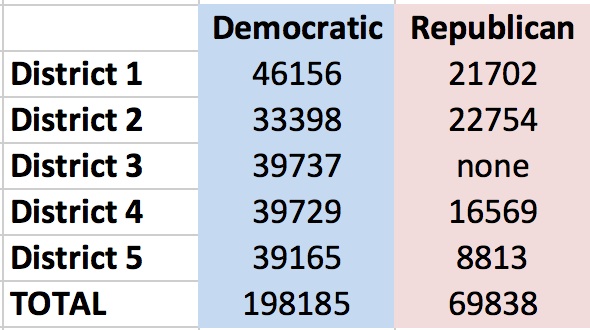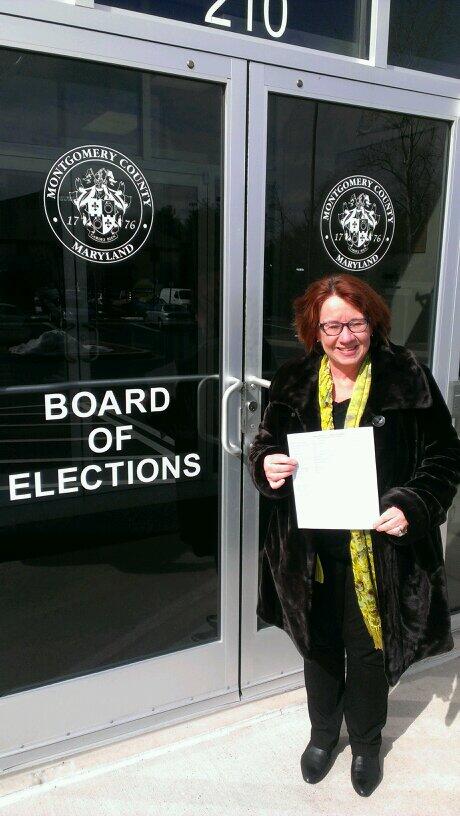Powerupmoco reports that the Maryland Senate voted to confirm Anne Hoskins to the Public Service Commission. Unusually, the nominee attracted opposition from the Governor’s own party with Sen. Rich Madaleno (D 18, Montgomery), who special ordered the nomination, voting no along with Sen. Karen Montgomery (D 14, Montgomery) and Sen. Ron Young (D 4, Frederick). All are strong progressives. See here for more information on why the nomination was controversial.
Monthly Archives: February 2014
Dems Way Ahead in GA after Filing Deadline
The votes are not in. Not a single ballot has been counted. Even in the primary. But the Democrats are already well on their way to retaking the General Assembly in 2014.
The filing deadline has passed. Democratic senatorial candidates face no Republican opponent in 18 legislative districts compared to just 5 Republicans without Democratic opponents. Democrats have to win just five more LDs to regain their majority.
On the House side, Democrats have effectively already won 52 seats, as Republicans have filed too few candidates in many districts to gain seats even if they won. In contrast, Democrats have left Republicans unopposed for just 5 seats. Democrats need just 19 more House seats for a majority.
In short, Democrats have already won 38% of Senate seats and 37% of House seats due to the lack of opposition. Republicans have won 11% of Senate seats, meaning that just under one-half of all LDs lack two major party candidates. The Republicans have won fewer House seats–under 4%–by default. Nearly 60% of seats for the House of Delegates will have full competition in the general election.
(Note: I’ve ignored third-party candidates here as none of them seem to have any possibility of victory.)
Reforming MoCo Council Elections
As previous posts have highlighted (here, here, and here), Democrats dominate Montgomery County elections with vanishingly small hope for Republicans. They don’t even bother to field candidates for a majority of the seats.
While Montgomery Democrats may cherish Republican-free Montgomery, it creates other problems for democratic governance. Relatively few people actually elect the Council. It is difficult to hold officials accountable when there is essentially no viable “out” party. It increases factionalism on the Council and makes it easier for councilmembers to shift positions without consequence.
This post suggests two reform methods, one simple and one more radical. The key to assessing any reform is to examine not just how it affects fairness or representation but also governance. While fairness is great, one needs to keep in mind the impact of changes on other aspects of our democratic system.
The first reform is very straightforward: abolish all of the at-large seats except one and increase the number of districts by three so the Council remains the same size. This change would reduce the ratio of constituents to councilmembers from roughly 200,000 to 125,000, the same as the state legislature, and make it easier for constituents and councilmembers to keep in touch.
The at-large member could be the council chair, eliminating the jockeying for this visible post. Alternatively, all of the members could be elected from districts and continue to select the council chair from among their membership.
Advantages of this reform include a reduction in the cost of campaigns. Districts would be smaller so candidates would have to spend less money to campaign in them, possibly making it easier for less well-heeled candidates to enter races.
Opponents would argue that it eliminates councilmembers who take the whole county into account. But all councilmembers have their bases of support and three out of four at-large councilmembers currently hail from Silver Spring. Upcounty and West County folks might welcome additional representation in Rockville.
The real disadvantage is that it might leave us in much the same boat as now. It is virtually impossible to draw a Republican district in Montgomery, so we’d still have a single-party council with no representation of the permanent “out” party.
The second reform would address this issue. Voters would cast ballots just as now in the five districts. The votes in these districts would then be aggregated to distribute the remaining four at-large seats such that the overall allocation reflects this total, taking into account the number of district seats won by a party.
An example helps to illustrate. Suppose that the general election results fell on the following lines:
 Democrats would win all five districts and receive those seats immediately. The allocation of the remaining four seats would occur in a manner designed to produce a proportional distribution among all of the seats.
Democrats would win all five districts and receive those seats immediately. The allocation of the remaining four seats would occur in a manner designed to produce a proportional distribution among all of the seats.
In this simulated election, Republicans received 26% of the vote. A proportionate allocation would award the Republicans two of the nine total seats (at least based on the Ste. Laguë method of PR which I used here since it is considered very fair). As a result, the Republicans should receive two of the four at-large seats with the others going to the Democrats for a 7-2 Council.
This reform would have several positive consequences. First, it would encourage the Republicans to regularly run candidates for all district seats, increasing the political competition vital to democracy. After all, the Republicans might have garnered a third seat if they had run a candidate in District 3.
Additionally, it encourages all parties to work to increase turnout even in safe seats to make sure that they win as many seats as possible. In short, it eliminates advantages gained through winning seats in low-turnout district elections. This might even augment Montgomery’s influence in statewide races as we increase our relative voter muscle compared to the rest of the State.
This change would also create a majority and minority party in Rockville. Voters could thus reward or punish the performance of each party, increasing accountability, even if the Democrats continue their overall dominance. Parties instead of Democratic factions would help give coherence to Montgomery politics.
Critics would likely contend that it emphasizes party at the expense of candidates. First, let’s be up front and acknowledge that few county residents can identify many of their councilmembers and certainly do not know enough about them to make particularly informed judgments.
Second, candidates would still be very important as each party would want to run its most attractive candidates in order to increase its overall vote. Smart Republicans would want to nominate relative moderates to maximize their vote.
Of course, neither reform seems likely to be adopted. Incumbents love the status quo because, after all, it chose them. And I cannot say that I especially blame them. People in all walks of life like to keep their jobs and systems that work for them.
Frick Upends D16 Race
In a surprise just before the filing deadline, Del. Bill Frick (D 16) changed his plans and abandoned his bid for attorney general:
Today I will withdraw my candidacy for the Democratic Nomination for State Attorney General and file for re-election to the Maryland House of Delegates.
My two terms in the House have been exceptional. I’ve been a part of a team that has enacted marriage equality for all Maryland couples, repealed the death penalty, protected consumers from abuses, and begun the task of reforming our tax code.
While I know that I could have been a valuable asset to the State as Attorney General, there is still much to be done as a member of the House representing District 16.
Bill was always a long shot for AG. His withdrawal from that race can’t help but aid Sen. Brian Frosh from the same legislative district in his bid to beat Del. Jon Cardin and Del. Aisha Braveboy for the Democratic nomination for AG.
Rumor had it that Bill might retire from politics if he didn’t win election to AG, so the switch to the delegate race is a bit of a double surprise–at least to your gentle correspondent. In this case, a politician staying in office is good news.
Bill is a terrific delegate: smart, effective, and well-liked by his colleagues. He is a shoo-in for reelection to the House of Delegates and I assume he will slate with incumbent Sen. Susan Lee and Del. Ariana Kelly.
In possibly the understatement of the year, Marc Korman, Hrant Jamgochian and Jordan Cooper have to be mighty unhappy tonight. In my recent preview of the D16 race, I gave Marc and Hrant a strong edge to win (though left Jordan in the hunt) and hinted that Susan and Ariana might slate with them.
Bill’s reentry changes that. Only one delegate seat is now open, though all three are up for reelection. Choosing between Marc and Hrant for a slate is not an easy call. We’ll see if the incumbents make a choice or just leave it up to the voters.
If I had to bet, I’d say they do the latter. In Montgomery County, incumbents don’t often slate with non-incumbents, though there are signs that this tradition is falling by the wayside. Neither Marc nor Hrant has such a clear edge that it makes it easy for the incumbents to opt for one over the other.
The D16 race for the third slot just got much more competitive and interesting.
Walling Withdraws in D16, Files for MCDCC
Kevin Walling has dropped his uphill bid for a delegate seat in District 16 and has refiled as an at-large candidate for the Montgomery County Democratic Central Committee (MCDCC). See here for more information on how the race is shaping up.
Surprise Roger! Duchy Files.
 Former At-Large Councilmember Duchy Trachtenberg has now filed to run against incumbent Roger Berliner in the Democratic Primary for the Montgomery County District 1 seat, which ranges from Chevy Chase to Whites Ferry. Roger will be seeking his third term while Duchy will be seeking to return after losing reelection for an at-large seat four years ago. My previous post on Duchy here and great analysis by Adam Pagnucco of why she lost four years ago here.
Former At-Large Councilmember Duchy Trachtenberg has now filed to run against incumbent Roger Berliner in the Democratic Primary for the Montgomery County District 1 seat, which ranges from Chevy Chase to Whites Ferry. Roger will be seeking his third term while Duchy will be seeking to return after losing reelection for an at-large seat four years ago. My previous post on Duchy here and great analysis by Adam Pagnucco of why she lost four years ago here.
My immediate guess is this race will be ugly. Neither minds throwing a rhetorical punch or arguing their case. Duchy will probably try to paint herself as the true progressive woman as opposed to insider lawyer Berliner.
Roger has $52K in his campaign kitty while Duchy has $123K. Both will raise more. Each has their set of fans but also have developed some enemies in the district. It will be interesting to see if any of Duchy’s former colleagues endorse her over Roger, their current colleague.
Henry Takes on Conway in D43
District 43 is the first African-American-majority district (63% black) in this series previewing the upcoming 2014 elections. Like District 46, District 43 survived redistricting with relatively little change despite the need to reconfigure Baltimore City’s districts due to its usual decennial loss of representation. District 43 remains roughly the same area between N. Charles and Harford Rd.
Sen. Joan Carter Conway served on the City Council for two years before being appointed to the Senate in 1997, when incumbent Sen. John Pica chose to retire. In 2010, Conway easily turned back challenger Hector Torres who ran to her left and won 30% of the primary vote.
This year, she faces a challenge from Baltimore City Councilman Bill Henry (D 4). Sen. Conway along with slate mate Del. Maggie McIntosh have supported Henry’s opponents in his previous City Council races, so alliances are already drawn.
Councilman Henry was an early, vocal, and valuable ally for marriage equality who testified repeatedly for the bill. Sen. Conway came to support it later in 2011, but she stuck firmly with the pro side in votes on the issue from that point onward.
Probably more salient for the election in terms of issues is a likely clash over liquor regulation–an issue cited by Henry is his announcement. Conway’s late husband was a city liquor board inspector. Her past opposition to allowing Marylanders to have wine shipped to their homes is indicative of her close ties to the liquor lobby.
Conway received some bad press in the wake of her involvement in a dispute at a property action. The man who owned the property prior to its sale at the public auction accused her of assault and posted this cellphone video:
However, the video did not substantiate his case well, at least to this viewer. Sen. Conway and two other people were walking away from the camera when he followed them. At one point, Conway appears to put her hand on the camera lens but it’s not clear from the video that she did anything to the camera. In another moment, you can see Conway trying to dissuade her companion from escalating the argument. You watch and draw your own conclusions.
Regardless of a bout of negative media attention and though he would otherwise be a promising challenger and senator, Henry’s lack of campaign funds severely hinders his campaign. He has only $8K in his campaign account compared to Conway’s $106K–a nice amount in a district where “walking around” money is said to remain a valuable resource. And Conway will have the strong support of all three incumbent delegates who will form a united slate for reelection.
The elections for delegate are quiet. Incumbents Del. Curt Anderson, Maggie McIntosh, and Mary Washington are all seeking reelection. Their one filed opponent, Timothy Vance, has not filed a campaign report. He describes himself on Facebook as a “regular citizen of Baltimore” and will remain so after the election.
Del. McIntosh is the senior pol in this district. She was first elected to the House in 1992 and served as U.S. Sen. Barbara Mikulski’s campaign manager and state director in the previous four years. A former House Majority Leader, she has chaired the Environmental Matters Committee since 2003 and is close to Speaker Michael Busch. McIntosh is seen as one of the most likely–possibly the most likely–to succeed him but many less senior delegates are also restless after ten years of a largely unchanged leadership.
Del. Anderson served in the House from 1983-95. In 1994, he ran for the Maryland Senate but lost with 44% to incumbent Pica. Anderson rejoined the House in 2003. Del. Washington first ran for the House in 2006. Though she lost, she came in a respectable fourth in the primary and easily won the nomination for the open seat in 2010 on a slate with the other incumbents.
While McIntosh has $77K in her campaign account, her colleagues have little–just $5K for Anderson and less than $1K for Washington. But Vance did not even file a report and has no record of even having a campaign account.
No Republicans have filed for any of the legislative seats.
UPDATE: I mistook Mary Washington’s account for that of another candidate. Del. Washington has $50K cash on hand, which renders her a well-funded candidate.
Tick Tock: Filing Deadline Today
I’m sure all candidates who have already filed as candidates in this year’s state and local elections will be eternally grateful for this reminder. Last chance to get out in the snow and file those papers. (And if you’re not running, don’t forget to withdraw your candidacy–that doesn’t happen by magic either.)
How Electoral Rules Shape County Council Partisanship
Maryland counties use a number of different methods to elect their county legislatures (see below for a description of how each county conducts its elections). The rules of the electoral game influence the outcome, as at-large elections facilitate one-party sweeps.
Twelve counties elect their councils entirely at-large throughout the county. The number will decline to eleven when Frederick elects its first charter government this year. Cecil and Garrett have district residency requirements for candidates but still elect them at-large. Cecil also staggers its elections.
Nine of the twelve counties with solely at-large elections have legislatures with members from only one party. In the remaining three, there is only one minority (Democratic) representative. (Of course, Kent has only three commissioners so the minority has to consist of only one commissioner.)
Eight counties elect their councils entirely from single-member districts. Districts can help with compliance with the Voting Rights Act by preventing the submergence of minorities among larger minority populations. Worcester County, for example, has a black district that resulted from voting rights litigation.
Districts also facilitate minority party representation. Only two of the eight counties elected entirely by district have single-party governments. Districts enable minority party representation so long as the minority comprises a majority within one of the districts. Minorities can still fail to win representation if their support is evenly distributed or just too weak, as in Carroll and Prince George’s Counties.
Three counties and Baltimore City elect their legislatures via a mixture of single-member districts and at-large. Baltimore City and Harford elect all councilmembers from districts except the city/county council president. Frederick will adopt Wicomico’s system of five from districts and two at-large when it elects its first charter government this year.
Uniquely, Montgomery elects four at-large in addition to five from districts. In this populous county, at-large councilmembers represent significantly more people than Members of Congress. And even the district councilmembers have roughly 200,000 constituents.
Among counties with mixed systems, heavily Democratic Baltimore City and Montgomery County have entirely Democratic councils. Harford and Wicomico have Republican majority counties with Democratic minorities.
Next Up: Ideas for creating more competition in Montgomery.
ALL ELECTED AT-LARGE
Allegany: three commissioners.
Calvert: five commissioners.
Caroline: three commissioners.
Cecil: five councilmembers. There are five districts and residency requirements but county voters elect all five. Elections are staggered so that the election of two coincides with the presidential election and three with the gubernatorial election.
Charles: five commissioners.
Frederick: five commissioners (through 2010).
Garrett: three commissioners. There are three districts and residency requirements but county voters elect all at-large.
Kent: three commissioners.
Queen Anne’s: five commissioners.
St. Mary’s: five commissioners.
Talbot: five councilmembers.
Washington: five commissioners.
ALL ELECTED FROM DISTRICTS
Anne Arundel: seven councilmembers.
Baltimore County: seven councilmembers.
Carroll: five commissioners.
Dorchester: five councilmembers.
Howard: five councilmembers.
Prince George’s: nine councilmembers.
Somerset: five commissioners.
Worcester: seven commissioners.
MIXED
Baltimore City elects 14 councilmembers from districts and the city council president at-large.
Starting in 2014, Frederick will elect five councilmembers from districts and two at-large.
Harford elects six councilmembers from districts and the council president-large.
Montgomery elects five councilmembers from districts and four at-large.
Wicomico elects five councilmembers from districts and two at-large.
Lierman Has Inside Track in D46
Compared to other Baltimore City districts, redistricting left District 46 unscathed and it still encompasses the neighborhoods surrounding the harbor. Like all of Baltimore City, District 46 is Democratic turf. No Republican has bothered to file for the legislature, so the Democratic primary is the election.
Sen. Bill Ferguson demolished incumbent Sen. George Della with 59% of the vote in the 2010 Democratic primary. An impressive accomplishment, as Della had served since 1990 and is the son of a previous Senate President from the district with the same name. Coasting to his second term with only nominal opposition and $121K in his campaign account, Ferguson is just 30 years old. For these reasons alone, he has to be one to watch.
The two incumbent delegates seeking reelection, Del. Luke Clippinger ($52K) and Del. Peter Hammen ($121K), should also be safe. Hammen is the senior member of the delegation, having served since 1994. He is also the most powerful, as he holds the Chair of the Health and Government Operations Committee. Clippinger is an assistant state’s attorney in Anne Arundel and unsurprisingly serves on the Judiciary Committee. He was a real leader in the fight for marriage equality.
Attorney Brooke Lierman, who graduated from Walt Whitman HS in Montgomery County, is the favorite for the open seat for several reasons. First, she is the daughter of former Democratic Party Chair Terry Lierman (and sister of Kyle Lierman, who ran in D16 in 2010). Relatedly, she has $104K in her campaign account and the ability to raise more. My guess is also relatedly, Ferguson, Clippinger, and Hammen have formed a slate with her. Finally, it doesn’t hurt that she is reported to be very nice.
Lierman is not a total lock for the seat. Bill Romani ran for delegate in 2010 and came in a respectable fourth. Romani has good name recognition and will probably raise enough money to run a respectable campaign–he now has $33K in the bank. But all that respect probably won’t be enough to overcome Lierman’s money and the slate, though expect him to do his best to surprise.





